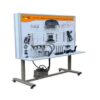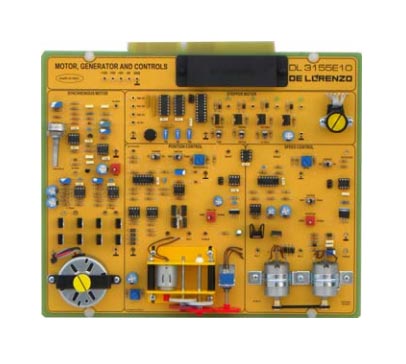THEORETICAL TOPICS
• Types of electric motors
• Familiarization with AC motor circuits
• Familiarization with DC motor connection types
• Familiarization with stepper motor circuits
• Main characteristics of DC motor driving systems
• Speed variation in motor controls
• Position control with DC motor
• PWM DC motor control
• Bi‐directional H bridge DC motor control circuit
• Advantages and disadvantages of synchronous motors
• Comparison between stepper motor and DC motor
• Familiarization with unipolar/bipolar/bifilar/multiphase stepper motors
• Fault simulation
CIRCUIT BLOCKS
• Synchronous motor
• Stepper motor
• Open/Closed loop position control of a DC motor
• Digital/Analog position control of a DC motor
• Open/Closed loop speed control of a DC motor with Tachogenerator
• Digital/Analog speed control of a DC motor with Tachogenerator
Complete with theoretical and practical manual.
Dimensions of the board: 297x260mm
MOTORS, GENERATORS AND CONTROLS
The design and construction of electronic circuits to solve practical problems is an essential technique in the fields of electronic engineering and computer engineering.
With this board the students can study the characteristics and the operating principles of the DC motors and generators. It also offers the opportunity to study the speed and position control techniques for the DC motors as the PWM and the closed loop controls.
















